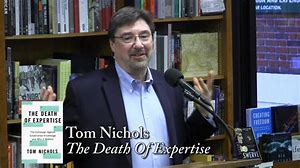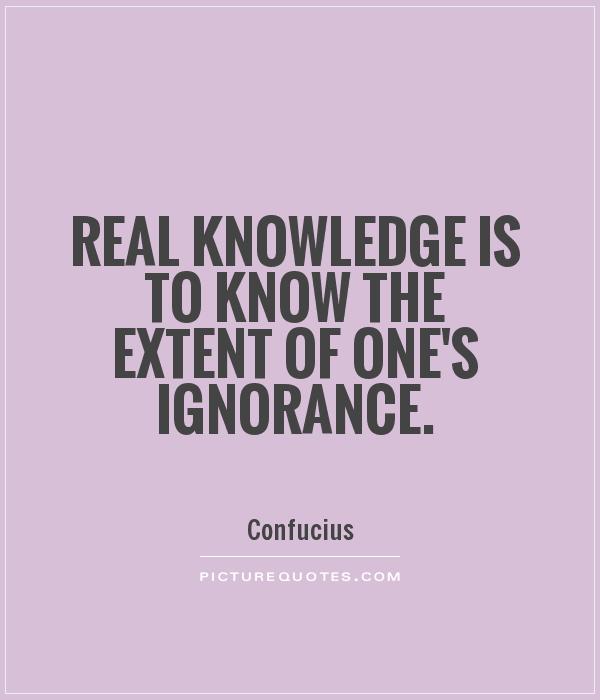
Life Goal. One of my goals in life is to increase my ignorance. That sounds silly, but in a sense is very important to a life-long learner. Let’s explore what I mean
Our granddaughter Andrea is completing her PhD in medical sociology at the University of Colorado. She recommended we read a book together. Her recommendation was The Death of Expertise (The campaign against established knowledge and why it matters) by Tom Nichols.
In addition to having the joy of a shared experience with my favorite oldest granddaughter the book is a thoughtful read. Several items in the book have caught my attention. I want to discuss ignorance today.

Context revisited. As a way of introduction, consider an important topic I have previously discussed: context. When I taught, one of the demonstrations I used to show the importance of context was to read to my class a paragraph from a textbook by Gravetter and Wallnau.
The procedure is actually quite simple. First you arrange things into different groups depending upon their makeup. Of course, one pile may be sufficient depending on how much there is to do. If you have to go somewhere because of the lack of facilities that is the next step, otherwise you are pretty well set. It is important not to overdue any particular endeavor. That is, it is better to do too few things than too many. In the short run this may not seem too important, but complications from doing too many things can easily arise. A mistake can be expensive as well. The manipulation of the appropriate mechanism should be self-explanatory, and we need not dwell on it here. At first the whole procedure will seem complicated. Soon however, it will become just another fact of life. It is difficult to foresee any end to the necessity for this task in the immediate future, but then one can never tell.
After I read the paragraph, I asked students, “What is the paragraph all about?” Then I listened to their answers. None of which were correct.
Next I established a context with two words: washing clothes. Almost magically the paragraph made sense. Context made understanding simple.
My point today is not about context but the students’ response to my question; what is the paragraph about? Without context the paragraph is nonsense, gobbledygook. Yet student after student made up responses. Rarely did I have someone say: I do not know.
That brings me to the important point in Nichols book: We are afraid to acknowledge our ignorance!
He points out many studies have shown “people who do not know much about a particular set of technical, cognitive or social skills tend to grossly overestimate their prowess and performance.” They do not understand their ignorance.
A psychologist named Dunning reports conducting a survey asking respondents about concepts from science. Some were real but several others were fake concepts. A very striking result occurred in one study. Ninety percent of the people surveyed claimed some knowledge of the fictitious concepts. The big problem is the people who claimed to know more about a subject were more likely to claim they knew one of the fictitious subjects. They were reluctant to accept their ignorance in an area they thought they understood. Recognizing, understanding and accepting our ignorance is important.

I want to be more ignorant. As I said, one of my goals is to increase my ignorance. The age old truth is –the more I know I know, the more I know I do not know. In a clear sense, the more I learn, the more ignorant I should become, because I am learning what I do not know.
When I learned the planets in grade-school, naming them was pretty much the limit of my knowledge of space. As I have grown in my understanding of space I now recognize I have a vast ignorance of what exists and what is happening in space. Learning something exposed me to a vastness of knowledge I will never know. It is good that I have learned more and it is also good that I know my ignorance.
If I learn something new in an area that should mean I realize how much more I do not know in that area. I should be happy for the gained knowledge and for the increase my ignorance at the same time. Too many people try to learn a few things and are limited by that knowledge. They fear opening up their minds and accepting what they do not know.
To be an eager learner I should seek and gain new knowledge. In my opinion, a key to being a wise person is not just having knowledge. Having an understanding and acceptance of what I do not know is also necessary for wisdom.
My auto mechanic is a wise man. He tells me when he can repair my car and when he cannot. He has a wide range of knowledge about cars but accepts what he does not know or cannot do.
My friend Patrick, who helps me around our house, is a wise man. He is very handy and has considerable knowledge about home repairs. He will tell me if he does not know how to fix something. He accepts what he does not know or cannot do.
In this year of political upheaval, I do not hear many people admitting they do not know something. The politicians have all the answers if I will just trust them. Not a lot of wisdom on display.
I get very distressed when I read or hear people of faith (and people without faith) claim they have all the answers. We would be better off admitting there are things we do not understand. We would be better off saying—I do not know!
In my experience with students, in Dunning’s research and Nichols writing, in politics, in matters of faith, in my own life, I find accepting ignorance is not easy. It takes work; it takes humility.
I hope to always be eager to learn, confident in what I know and at the same time accepting of my ignorance.
Until next week
Peace
Jerry
0 Comments